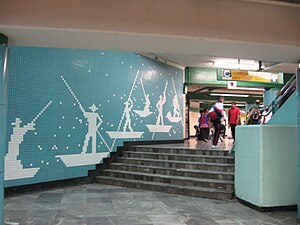Metro Santa Anita
|
Santa Anita
|
||||||||||||||||
|---|---|---|---|---|---|---|---|---|---|---|---|---|---|---|---|---|
| STC rapid transit | ||||||||||||||||

Stairs leading from the southbound platform of Line 8 to Line 4, showing mosaic of men in boats.
|
||||||||||||||||
| Coordinates | 19°24′10″N 99°07′18″W / 19.40273°N 99.121699°WCoordinates: 19°24′10″N 99°07′18″W / 19.40273°N 99.121699°W | |||||||||||||||
| Platforms | 4 | |||||||||||||||
| Tracks | 4 | |||||||||||||||
| History | ||||||||||||||||
| Opened | 26 May 1982 | |||||||||||||||
| Services | ||||||||||||||||
|
||||||||||||||||
Metro Santa Anita is a station on the Mexico City Metro. Located in Mexico City's Iztacalco borough, the station is the current terminal of Line 4.
The station logo depicts a man sailing a canoe. This is because in the early 20th century, in the area where the station now stands, was the Santa Anita canal – a place used for chinampa-based agriculture. Today the canal has long since vanished, but the name Santa Anita is still used by the surrounding neighbourhood.
Metro Line 4 was originally projected to end in the Villa Coapa neighbourhood, in the southern borough of Coyoacán. Since the inauguration of Line B, however, no more lines have been constructed or extended, so Metro Santa Anita – and other stations, such as Metro Barranca del Muerto – officially remain provisional terminals. Metro Santa Anita is the least busy station on the Mexico City Metro, with only 621,867 passenger boardings in 2008.
Metro Santa Anita was originally to be named Metro Plutarco E. Calles, in honour of President Plutarco Elías Calles, according to early plans for Line 4.
...
Wikipedia
